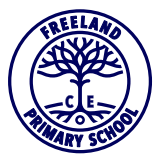History
Why do we teach History at Freeland Primary School?
The History curriculum at Freeland School makes full use of resources within the immediate and wider local area, enabling children to develop a deeper understanding of the history of their locality. Topics are designed to consider the interests of our children, as well as the context of the local area to maximise children’s interest and curiosity. The History curriculum is carefully designed to ensure children are taught the necessary skills to be a historian and that these are built on year on year. Where appropriate links are made between historical knowledge to enable children to gain a wider understanding of the relationships between different groups and draw comparisons. Our History curriculum develops a chronological understanding of British History from Stone Age to the present day and significant historical periods of world history are also studied to enable children to understand their significance in our lives today. Cross curricular links are made where appropriate. Children develop their critical thinking skills by looking at a variety of sources of evidence and are encouraged to ask and answer questions.
How do we teach History at Freeland Primary School?
History is taught through topics which allows knowledge and skills to be developed progressively from year to year. Knowledge organisers enable teachers to ensure that the key facts are taught to build children’s knowledge and that these facts can be revisited regularly in class quizzes to help the “sticky knowledge” to be retained. By the end of Year 6, children will have a sound chronological understanding of British History from the Stone Age to the present and will be able to identify similarities and differences between these periods. Knowledge of World history is also developed through studying ancient civilisations such as The Ancient Greeks.
Wherever possible, teachers take a cross curricular approach to teaching history and develop knowledge and skills in other areas of the curriculum such as DT, English and Geography. Trips to further children’s understanding of history are an integral part of how we teach history at Freeland School. Visits to museums, such as the Corinium Museum in Cirencester or the Ashmolean Museum in Oxford, and historical buildings and places (Roman Villa at North Leigh) are organised to deepen understanding.
Consideration is given to how greater depth will be taught, learnt and demonstrated within each lesson, as well as how learners will be supported in line with the school’s commitment to inclusion.
What is the impact of our teaching?
In ensuring high standards of teaching and learning in History, we implement a curriculum that is progressive throughout the whole school. History is taught as part of a topic, focusing on knowledge and skills outlined in the National Curriculum. We ensure that History has the same importance given to it as the core subjects, as we feel this is important in enabling all children to understand their roots and gain ‘real-life’ experiences to help them realise their place in the world.
Mini quizzes, brain dumps, retrieval challenges and carefully planned questioning by teachers allows formative assessment to take place during each lesson. At the end of each unit teachers will assess the children's understanding of the key concept questions on the knowledge, concept, vocabulary organiser through varied assessment activities.
